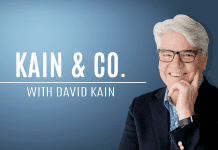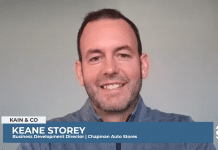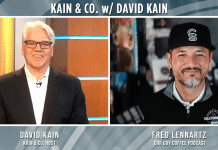Many headaches can be avoided in the dealership by using the right language with customers. On this week’s episode of Kain & Co., David Kain talks about how salespeople and BDC agents should talk to both service and sales customers.
VIDEO TRANSCRIPTION:
David Kain: Hello and welcome to Kain and Company here on the CBT Automotive Network. My name is David Kain. I’m the president of Kain Automotive. And I’d like to share with you some of the language that we like to encourage salespeople to use and BDC agents, whether working with service customers or sales customer. So let’s get right to it.
David Kain: So one of the first things that we’ve come to understand is how nerve wracking it is when a customer directs a question at you and you’re not quite prepared for your answer. We hear this all the time. We listened to a lot of phone calls the dealership personnel takes and and I’ve talked about this, and we believe one of the biggest reasons why there’s some issues in this regard is just preparation in knowing what to say. So some of the real hardball questions that come at us really should be something that we’re used to.
David Kain: One of the most often asked questions from a customer is what’s your best price. And when I’m listening to a phone call, inevitably what we hear is the stutter that tends to take place when that happens. So customer says, “Hey, what’s your best price?” Well, so I’m going to get with my manager. We’ve never lost a deal over price. Your presence is your leverage. If we’re within a couple of hundred bucks, don’t worry. And ultimately the customer knows that they’ve hit you right where it hurts, which is to catch you off guard. And they’ve probably read articles about that that say just be direct. Car salespeople might not know how to handle that.
David Kain: So one of the things that we’ve learned is to teach the pause that goes into with the right language. So regardless of the question, one of the things that I’d like to say immediately is, I’m glad you asked. So the customer says to me, “What’s your best price? And I want it out the door, your very lowest price.” I like to say, “I am so glad you asked. You sound just like me. I would want to know the exact same thing. I can help you with that right away. May I ask you a couple of questions so I can make sure I get you all the incentives and discounts that are available to you.” How can they turn that down?
David Kain: So one of the things as we break that apart, I want to share with you is the first opening phrase. Whether it’s I want to know what my trade is worth, I want to know what kind of interest is available, want to know if you can get my credit approved. I want to make sure that I immediately respond with, “Hey, I am glad you asked. You sound just like me. I would want to know the same thing if I were in shoes.” When we do that, what we do is we calm them down and we let them know, “Hey, I’m a professional. I am glad you asked. I would want to know the same thing. We’re just alike.” And people like to do business with people who they can interact with and they feel a kinship to. So by letting them know that you’re glad they asked and they sound just like you and you want to make sure that you provide that information for them, now they can relax a little bit. They might not have even been comfortable in the first place hitting you with such a direct question.
David Kain: So the second part of it is, “I can help you with that right away.” Letting them know that you’re the person. You’re not in a position, although you might have to go behind the curtain or go to an office or get a manager involved. What you are though is the person that can help them. And when you look at studies of professions ranked on ethics, and the Gallup Organization does this each year and you can Google it, just type in professions ranked on ethics. Nurses are always ranked number one in the last 23 years. Car salespeople are down at the bottom of telemarketers and members of Congress. And I think part of it is we get shaken up by some of the most mundane questions that we hear all the time. And candidly, whether it’s I want to know what my trade is worth, I want to know about financing, I want to know about the price. Those are all positive buying sides. So we should be glad they asked. And if you say to them, “I can help you with that right away,” now we’re going to take the pain away.
David Kain: We don’t have to freak them out with phrases like, “Well know your presence is your leverage.” Well I can’t be present because I’m three States away or I’m three hours away or I’m three months away. What I want to convey back to them is I can help you right away. So no need to worry about this. Don’t need to hang up and call back. Which by the way on another topic is why would you hang up when the customer’s really ready? Let’s go ahead and get the answers that we’re looking for right now while we’re ready.
David Kain: And the last part of that is when we say, I can help you with that right away. And we come back with may I. Think of may I versus can I. We all learned early on that may I was a polite way to present something. So may I ask you a couple of questions so that I can provide you the best incentives and the lowest possible pricing. Heck yeah. You can ask me all the questions you want because we’re on the same page now. You’re glad I asked. I sound just like you. You’re going to help me with that right away. Of course. What are your questions? Let’s get to it. We’re on the same page now. Think about how you can align with your customer and kind of results you would get if you would just start out using the right language. So I’m glad you asked. I can help you with that right away. May I ask a couple of questions? Give it a try. I think you’ll be surprised at how quickly that works for you.
David Kain: And I’m David Kain. I can’t thank you enough for joining me here on Kain and Company. We’ll see you next time.
Speaker 2: This has been a JBF Business Media production.





